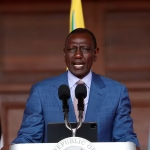In a move signaling a protracted path towards civilian governance, Niger’s military junta has officially declared a five-year transition period, commencing from Wednesday. This declaration, made during a formal signing ceremony for a new transition charter, marks a significant, albeit lengthy, chapter in the nation’s political landscape, following the 2023 coup that ousted President Mohamed Bazoum.
The extended timeline, as announced, aligns with recommendations put forth in February by a commission tasked with charting the nation’s political future after a series of national dialogues. This development, however, raises critical questions about the stability and pace of democratic restoration in a region already grappling with profound instability.
“This five-year period, it feels long, doesn’t it?” I find myself pondering, reflecting on the potential implications for ordinary Nigeriens. For them, this extended timeline might translate into prolonged uncertainty, economic hardship, and the continued struggle against militant groups.
The backdrop to this transition is deeply intertwined with the broader geopolitical shifts in the Sahel region. Like their counterparts in neighboring Mali and Burkina Faso, Niger’s military leaders have severed ties with French and European forces, opting instead for closer security cooperation with Russia. This realignment has reshaped the regional power dynamics, introducing new layers of complexity to an already volatile security environment.
The decision to embrace a five-year transition, while presented as a structured approach, invites scrutiny. Critics might argue that such a protracted timeframe could consolidate the junta’s power, delaying a genuine return to democratic rule. However, proponents may counter that it allows for a more deliberate and thorough restructuring of the state, particularly in light of the security challenges posed by militant groups.
Read Also: Sahel Alliance Unveils Flag, Passport, and Troop Force Amid Regional Shift
For Nigeriens, the daily realities of life – access to basic services, security, and economic stability – hang in the balance. The ongoing struggle against militant groups, often exacerbated by regional instability, creates a precarious environment for civilians.
According to Reuters report, the timeline was based on “recommendations made in February by a commission following national discussions.” This indicates a process, albeit perhaps a controlled one, of gathering input. However, the true test lies in how effectively these recommendations are translated into tangible improvements for the populace.
The international community watches closely, aware that the stability of Niger directly impacts the wider Sahel region. The implications of this five-year transition will reverberate beyond Niger’s borders, influencing regional security and the delicate balance of power.
The path ahead remains fraught with uncertainties, but one thing is clear: the next five years will be pivotal in determining Niger’s trajectory. As we observe these developments, it is imperative to remember that behind the political headlines are the lives and livelihoods of millions of Nigeriens, whose resilience and hope will ultimately shape the nation’s future.













